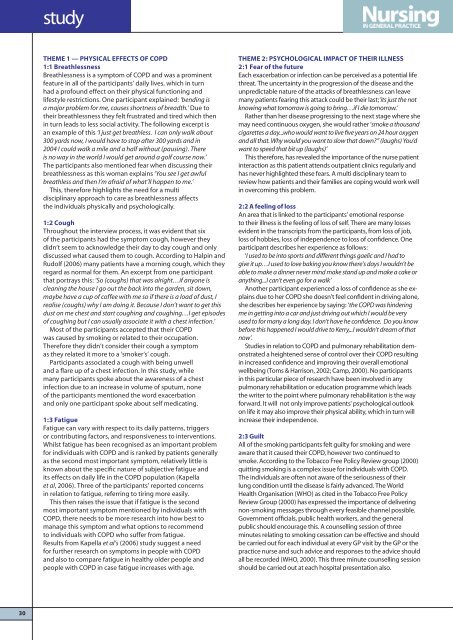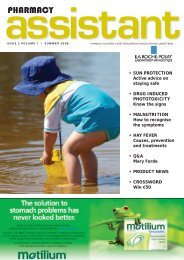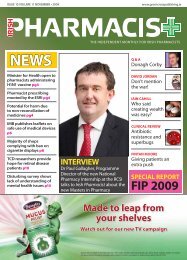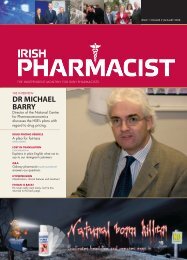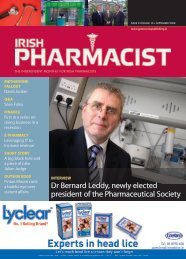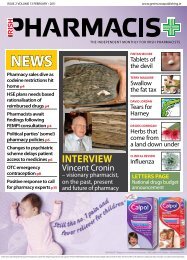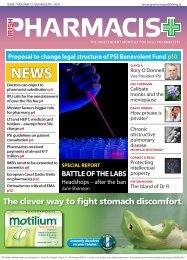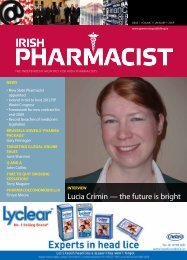veNTIlATIoN - Green Cross Publishing
veNTIlATIoN - Green Cross Publishing
veNTIlATIoN - Green Cross Publishing
You also want an ePaper? Increase the reach of your titles
YUMPU automatically turns print PDFs into web optimized ePapers that Google loves.
30<br />
study<br />
Theme 1 — PhysIcAl eFFecTs oF coPd<br />
1:1 breathlessness<br />
Breathlessness is a symptom of COPD and was a prominent<br />
feature in all of the participants’ daily lives, which in turn<br />
had a profound effect on their physical functioning and<br />
lifestyle restrictions. One participant explained: ‘bending is<br />
a major problem for me, causes shortness of breadth.’ Due to<br />
their breathlessness they felt frustrated and tired which then<br />
in turn leads to less social activity. The following excerpt is<br />
an example of this ‘I just get breathless. I can only walk about<br />
300 yards now, I would have to stop after 300 yards and in<br />
2004 I could walk a mile and a half without (pausing). There<br />
is no way in the world I would get around a golf course now.’<br />
The participants also mentioned fear when discussing their<br />
breathlessness as this woman explains ‘You see I get awful<br />
breathless and then I’m afraid of what’ll happen to me.’<br />
This, therefore highlights the need for a multi<br />
disciplinary approach to care as breathlessness affects<br />
the individuals physically and psychologically.<br />
1:2 cough<br />
Throughout the interview process, it was evident that six<br />
of the participants had the symptom cough, however they<br />
didn’t seem to acknowledge their day to day cough and only<br />
discussed what caused them to cough. According to Halpin and<br />
Rudolf (2006) many patients have a morning cough, which they<br />
regard as normal for them. An excerpt from one participant<br />
that portrays this: ‘So (coughs) that was alright…if anyone is<br />
cleaning the house I go out the back into the garden, sit down,<br />
maybe have a cup of coffee with me so if there is a load of dust, I<br />
realise (coughs) why I am doing it. Because I don’t want to get this<br />
dust on me chest and start coughing and coughing…I get episodes<br />
of coughing but I can usually associate it with a chest infection.’<br />
Most of the participants accepted that their COPD<br />
was caused by smoking or related to their occupation.<br />
Therefore they didn’t consider their cough a symptom<br />
as they related it more to a ‘smoker’s’ cough.<br />
Participants associated a cough with being unwell<br />
and a flare up of a chest infection. In this study, while<br />
many participants spoke about the awareness of a chest<br />
infection due to an increase in volume of sputum, none<br />
of the participants mentioned the word exacerbation<br />
and only one participant spoke about self medicating.<br />
1:3 Fatigue<br />
Fatigue can vary with respect to its daily patterns, triggers<br />
or contributing factors, and responsiveness to interventions.<br />
Whilst fatigue has been recognised as an important problem<br />
for individuals with COPD and is ranked by patients generally<br />
as the second most important symptom, relatively little is<br />
known about the specific nature of subjective fatigue and<br />
its effects on daily life in the COPD population (Kapella<br />
et al, 2006). Three of the participants’ reported concerns<br />
in relation to fatigue, referring to tiring more easily.<br />
This then raises the issue that if fatigue is the second<br />
most important symptom mentioned by individuals with<br />
COPD, there needs to be more research into how best to<br />
manage this symptom and what options to recommend<br />
to individuals with COPD who suffer from fatigue.<br />
Results from Kapella et al’s (2006) study suggest a need<br />
for further research on symptoms in people with COPD<br />
and also to compare fatigue in healthy older people and<br />
people with COPD in case fatigue increases with age.<br />
Theme 2: PsychologIcAl ImPAcT oF TheIr IllNess<br />
2:1 Fear of the future<br />
Each exacerbation or infection can be perceived as a potential life<br />
threat. The uncertainty in the progression of the disease and the<br />
unpredictable nature of the attacks of breathlessness can leave<br />
many patients fearing this attack could be their last;‘its just the not<br />
knowing what tomorrow is going to bring…if I die tomorrow.’<br />
Rather than her disease progressing to the next stage where she<br />
may need continuous oxygen, she would rather ‘smoke a thousand<br />
cigarettes a day...who would want to live five years on 24 hour oxygen<br />
and all that. Why would you want to slow that down?” (laughs) You’d<br />
want to speed that bit up (laughs)’<br />
This therefore, has revealed the importance of the nurse patient<br />
interaction as this patient attends outpatient clinics regularly and<br />
has never highlighted these fears. A multi disciplinary team to<br />
review how patients and their families are coping would work well<br />
in overcoming this problem.<br />
2:2 A feeling of loss<br />
An area that is linked to the participants’ emotional response<br />
to their illness is the feeling of loss of self. There are many losses<br />
evident in the transcripts from the participants, from loss of job,<br />
loss of hobbies, loss of independence to loss of confidence. One<br />
participant describes her experience as follows:<br />
‘I used to be into sports and different things gaelic and I had to<br />
give it up…I used to love baking you know there’s days I wouldn’t be<br />
able to make a dinner never mind make stand up and make a cake or<br />
anything...I can’t even go for a walk’<br />
Another participant experienced a loss of confidence as she explains<br />
due to her COPD she doesn’t feel confident in driving alone,<br />
she describes her experience by saying: ‘the COPD was hindering<br />
me in getting into a car and just driving out which I would be very<br />
used to for many a long day. I don't have he confidence. Do you know<br />
before this happened I would drive to Kerry,..I wouldn’t dream of that<br />
now’.<br />
Studies in relation to COPD and pulmonary rehabilitation demonstrated<br />
a heightened sense of control over their COPD resulting<br />
in increased confidence and improving their overall emotional<br />
wellbeing (Toms & Harrison, 2002; Camp, 2000). No participants<br />
in this particular piece of research have been involved in any<br />
pulmonary rehabilitation or education programme which leads<br />
the writer to the point where pulmonary rehabilitation is the way<br />
forward. It will not only improve patients' psychological outlook<br />
on life it may also improve their physical ability, which in turn will<br />
increase their independence.<br />
2:3 guilt<br />
All of the smoking participants felt guilty for smoking and were<br />
aware that it caused their COPD, however two continued to<br />
smoke. According to the Tobacco Free Policy Review group (2000)<br />
quitting smoking is a complex issue for individuals with COPD.<br />
The individuals are often not aware of the seriousness of their<br />
lung condition until the disease is fairly advanced. The World<br />
Health Organisation (WHO) as cited in the Tobacco Free Policy<br />
Review Group (2000) has expressed the importance of delivering<br />
non-smoking messages through every feasible channel possible.<br />
Government officials, public health workers, and the general<br />
public should encourage this. A counselling session of three<br />
minutes relating to smoking cessation can be effective and should<br />
be carried out for each individual at every GP visit by the GP or the<br />
practice nurse and such advice and responses to the advice should<br />
all be recorded (WHO, 2000). This three minute counselling session<br />
should be carried out at each hospital presentation also.


